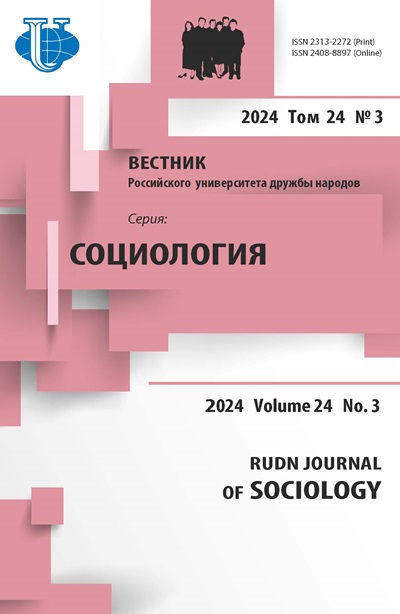Концептуальные и методические аспекты оценки готовности организации к внедрению инноваций
- Авторы: Неверов А.В.1, Дудник А.С.1
-
Учреждения:
- Российский университет дружбы народов
- Выпуск: Том 16, № 3 (2016)
- Страницы: 623-636
- Раздел: Социология управления
- URL: https://journals.rudn.ru/sociology/article/view/14007
Цитировать
Полный текст
Аннотация
В настоящее время российские организации столкнулись с необходимостью создания инновационных продуктов и наукоемких технологий, а также реализации управленческих нововведений. Значение изменений для социальной системы трудно переоценить, но сегодня для России инновационное развитие из просто важного социально-экономического вопроса стало проблемой первостепенной важности, нуждающейся в как можно более скором решении. Это связано с воздействием ряда факторов: во-первых, влияние санкций показало высокую потребность в автономной разработке многих видов технологий и техники; во-вторых, создание и внедрение инноваций необходимо для модернизации отечественной экономики и повышения эффективности российских компаний; в-третьих, без постоянного совершенствования науки и образования (что невозможно без инноваций) происходит социальная и культурная стагнация государства; в-четвертых, общемировая тенденция совершенствования производства определяет возникновение новых форматов экономического взаимодействия, в которых доминирующую роль играют наукоемкие, инновационные и конвергирующие технологии; в-пятых, одной из приоритетных задач страны на ближайшие годы выступает наращивание высокотехнологического потенциала и выход на ведущие международные рынки инноваций. Поэтому многим российским компаниям в ближайшее время придется более активно внедрять инновации в свою производственную деятельность. Успешность внедрения инноваций во многом зависит от того, насколько организация к ним готова, и особенно важна оценка готовности социальной среды организации к внедрению инновации, так как социальные аспекты комплексно влияют на управление инновациями. Чтобы оценить готовность социальной среды организации к внедрению инноваций, требуются методические подходы к ее изучению в рамках инновационного управления. В статье представлен обзор концептуальных подходов к управлению инновациями и предложена методика оценки готовности социальной среды организации к внедрению инноваций.
Об авторах
Александр Викторович Неверов
Российский университет дружбы народов
Автор, ответственный за переписку.
Email: neverov_av@pfur.ru
Москва, Россия
Александр Сергеевич Дудник
Российский университет дружбы народов
Email: asdudnik@mail.ru
Москва, Россия
Список литературы
- Анцупов А.Я., Ковалев В.В. Социально-психологическая оценка персонала. М., 2008.
- Бандуровский К.В. Бессмертие души в философии Фомы Аквинского. М., 2011.
- Бестужев-Лада И.В. Прогнозное обоснование социальных нововведений. М., 1993.
- Гегель Г. Лекции по истории философии. В 3 кн. СПб., 1993.
- Глазьев С.Ю. Теория долгосрочного технико-экономического развития. М., 1993.
- Гоббс Т. Сочинения: в 2 т. М., 1989.
- Декарт Р. Сочинения. В 2 т. Т. 1. М., 2001.
- Денисова А. Оценка должностей. URL: http://old.tci-co.ru/otsenka.html.
- Дюркгейм Э. Норма и патология // Социология преступности. М., 1966.
- Измерение эффективности персонала // Справочник по управлению персоналом. 2010. № 1.
- Камерон К., Куинн Р. Диагностика и изменение организационной культуры. СПб., 2001.
- Кант И. Лекции о философском учении о религии. М., 2016.
- Кнорр-Цетина К. Объектная социальность: общественные отношения в постсоциальных обществах знания // Журнал социологии и социальной антропологии. 2002. Т. 5. № 1.
- Князева Е.Н. Природа инноваций и некоторые проблемы инновационного управления // Управление: цели и ценность / Под ред. О.Я. Гелиха. СПб., 2004.
- Кондратьев Н.Д. Большие циклы конъюнктуры и теория предвидения. М., 2002.
- Конт О. Дух позитивной философии. Ростов н/Д., 2003.
- Кун Т. Структура научных революций. М., 2009.
- Левин М. Менеджмент будущего. Как устроена самая инновационная компания мира. URL: https://slon.ru/business/menegement_budushego_6_principov_upravleniya_832892.
- Локк Дж. Сочинения: в 3 т. Т. 3. М., 1988.
- Маркс К. Капитал. Критика политической экономии. М., 2011.
- Мартин П., Ричи Ш. Управление мотивацией. М., 2004.
- Мертон Р. Социальная структура и аномия // Социология преступности. М., 1966.
- Мор Т. Утопия. М., 1978.
- Мотовилин О.Г., Мотовилина И.А. Оценка персонала в современных организациях. Ассесмент-технологии. Профессиография. Организационная диагностика. М., 2009.
- Нельсон Р.Р., Уинтер С.Дж. Эволюционная теория экономических изменений. М., 2002.
- Норт Д. Институциональные изменения: рамки анализа // Вопросы экономики. 1997. № 3.
- Парсонс Т. Функциональная теория изменения // Американская социологическая мысль / Сост. А.И. Кравченко. М., 1994.
- Платон. Собрание сочинений: в 4 т. М., 1994.
- Реале Д., Антисери Д. Марк Аврелий. Западная философия от истоков до наших дней. Т. 1-2: Античность и средневековье. СПб., 2003.
- Реймаров Г.А. Комплексная оценка персонала: Инженерный подход к управлению качеством труда. М., 2010.
- Рунил Б.М. Творческий процесс в инновационном аспекте // Художественное и научное творчество. Л., 1972.
- Санто Б. Инновации как средство экономического развития. М., 1991.
- Сен-Симон А. Избранные сочинения. Т. 1-2. М.-Л., 1948.
- Серов В. Энциклопедический словарь крылатых слов и выражений. М., 2003.
- Собчик Л.Н. Методы психологической диагностики. Методическое руководство. М., 1990.
- Спивак В. Кейсы и методика их решения // Управление персоналом. 2006. № 3.
- Тененбаум Б. Великий Макиавелли: Темный гений власти: «Цель оправдывает средства?». М., 2012.
- Уорд П. Метод 360 градусов. М., 2006.
- Фейерабенд П. Избранные труды по методологии науки. М., 1986.
- Хайдеггер М. Время картины мира // Новая технократическая волна на Западе. М., 1986.
- Шереги Ф.Э., Ридегер А.В., Попов М.С. Малые инновационные предприятия вузов // Экономика образования. 2014. № 2.
- Штомпка П. Социология социальных изменений. М., 1996.
- Шумпетер Й.А. Теория экономического развития. М., 1982.
- Эриксен Т.Б. Августин. Беспокойное сердце. М., 2003.
- Freeman C. The national systems of the innovation historical perspective. Cambridge Journal of Economics. 1995. No 1.
- Kalecki M. Theory of Economic Dynamics. An Essay on Cyclical and Long-Run Changes in Capitalist Economy. N.Y., 1954.
- Lundvall B. National Systems of Innovation: Towards a Theory of Innovation and Interactive Learning. L., 1992.
- Nelson R. National Innovation Systems. A Comparative Analysis. Oxford, 1993.














